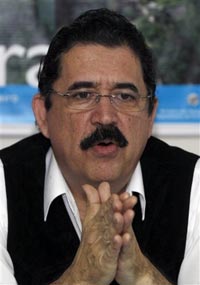19 November 2009 Edition
International: Honduras

Ousted Honduran President Manuel Zelaya
War on Democracy Continues
BY DARA MacNEILL
While the western powers never cease to promote their supposed ‘wars for democracy’ around the globe, in Latin America a somewhat less celebrated process is underway: here the war against democracy is gathering pace.
Take the case of Manuel Zelaya, the ousted and democratically-elected president of Honduras. Unlike Hamid Karzai in Afghanistan, Mr Zelaya won his own electoral battle in an open, honest and fully verified manner. Mr Karzai was found guilty of wholesale electoral fraud by an independent international investigation. Rather than being hounded from power, he was praised when he (very reluctantly) agreed to take part in a second election.
Mr Karzai remains in power with the full weight of the US military and political establishment ranged behind him (for the moment - he will be disposed of if another more ‘useful fool’ can be found).
President Manuel Zelaya – the legitimate president – on the other hand, was forcibly removed from the presidential palace by armed soldiers in the early hours of June 28 and ‘deported’ to nearby Costa Rica.
A ragbag of reactionaries took power in Tegucigalpa – headed by the (unelected) President Roberto Micheletti – and quickly began reliving Latin America’s nightmare years: civil liberties were suspended, the army was on the streets, those who voiced opposition were beaten and disappeared.
No country on earth has recognised this illegitimate government and Honduras was expelled from the Organisation of American States. Remarkably, some US aid kept pouring in – on the basis that it had already been agreed, while in September the International Monetary Fund announced that it would lend in excess of $150 million.
Incidentally, the illegitimate President Micheletti effectively rubbished the propaganda that had been used to support the coup – false claims that President Zelaya tried to cement his grip on power by tampering with the constitution, when he made public Zelaya’s greatest error: “He became friends with Daniel Ortega, Chavez, Correa (Ecuador), Evo Morales....he went to the left.”
A cardinal error. It is said that Zelaya sealed his fate when he announced a doubling of the impoverished country’s minimum wage.
However, despite the obvious injustice no great western power took up Zelaya’s cause and, arguably, only the repeated demands of Brazil’s President Lula and other Latin American leaders, ensured the issue was not ignored.
In late September Zelaya made a dramatic and clandestine return to Tegucigalpa, where he found refuge in the Brazilian embassy. This forced greater involvement of the US and OAS and, in early November, it appeared that a deal had been fashioned that would facilitate Zelaya’s return to power. But intransigence on the coup plotters’ side has now collapsed the nascent deal.
MERCENARIES
With scheduled presidential elections due for 29 November, Honduras is now entering a very hazardous period and the fact that a democratically-elected president can be kept from power by coup plotters sends a dangerous signal to very destabilising elements across Latin America.
Indeed, their presence in Honduras at the behest of the coup plotters has already been noted. In early October, a UN human rights panel warned of the presence of foreign mercenaries in the country – and not just any mercenaries, but members of the infamous United Self Defence Forces of Colombia (AUC).
The notorious AUC were formed in Colombia by Colombia’s drug cartels and the authorities, as a proxy in the state’s war with the FARC. The AUC took to the ‘war effort’ with gusto, attacking the civilian grassroots of the Colombian left and opposition with a ferocity matched only by Guatemala’s genocidal Generals, of the late 1980s. The AUC murdered trade unionists, journalists, human rights’ activists, indigenous and agricultural leaders in their thousands, while keeping the ‘lines’ open for traffickers.
The UN Working Group on the use of mercenaries has charged that an estimated 40 members of the supposedly ‘demobbed’ AUC were brought into Honduras by wealthy landowners to defend themselves “from further violence between supporters of the de facto government and those of the deposed President Manuel Zelaya.”
Former members of the Zelaya government have questioned whether their role is not to actually “do the dirty jobs the armed forces refuse to do.”
The UN body also claimed that the coup regime has further contracted an additional 120-150 mercenaries.
It is widely held in Colombia and abroad – with significant evidential support – that their own president, Alvaro Uribe played a key role in the establishment and running of the AUC, in his former role as a provincial governor.
Ironic therefore, but hardly surprising to find Uribe is also at the heart of the war against democracy, in Latin America.
Earlier this month, Colombia brought relations in the region to a new low when it emerged Uribe’s government had agreed a new 10 year deal with the US military. This gives the US military unfettered access to seven Colombian army, navy and airforce bases and also permission to use civilian airports.
The deal provides that US military personnel and ‘contractors’ – new name for mercenaries – will also enjoy diplomatic immunity.
Uribe claims the deal is to assist the ‘war on drugs’, but many in Colombia and throughout the region – including neighbouring Venezuela – had reason to doubt him. And then the Colombian magazine Cambio gave substance to their doubts when it revealed hitherto unknown details of the deal, including the rather telling assessment of the US airforce, in a document it presented to the US Congress.
Urging support for the deal, the airforce pointed out that access to the bases and their location would give the US military the capacity for “full spectrum dominance” of the region.
Once again it appears that Latin America is to become the fulcrum in the battle of the old orders versus the new.
